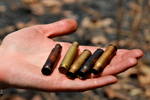
Defensive elephants in Tanzania, where experts say corrupt wildlife rangers have helped poachers decimate the nation’s elephants for the black market ivory trade. Photo by: Rhett A. Butler.
Corruption among wildlife rangers is becoming a serious impediment in the fight against poaching, fuelled by soaring levels of cash offered by criminal poacher syndicates, senior conservation chiefs have admitted.
Rangers in countries as diverse as Tanzania and Cambodia are being bribed by increasingly organised poaching gangs keen to supply ivory, rhino horn and tiger parts to meet huge consumer demand in Asia.
While prices for ivory and rhino horn, in particular, have risen dramatically in recent years, ranger wages have failed to keep pace, resulting in a spate of bribery scandals.
“There’s more money floating around now from the poachers, so it’s more of a problem than ever before,” said Sean Willmore, president of the Australian-based International Ranger Federation.
“It’s as bad as I’ve known it. If rangers aren’t getting enough remuneration, they can be corrupted. In Cambodia, for example, rangers were being paid $100 a month and that was cut to $30 a month by the government. What do you do if you want to feed your family?”
While rangers in many countries remain chronically underfunded, with Willmore claiming that a lack of proper equipment and training is rife in poaching hotspots, the rewards for turning a blind eye to the illegal killing of rhinos and elephants have never been higher.
The standard “bush” market value of ivory is $300 per kilogramme, meaning that a 30kg haul from a single elephant can bring in $9,000. From this, a ranger that turns a blind eye can get a cut of $2,000—far more than his or her standard salary.
The situation is particularly dire in Tanzania, which is losing around 70 elephants a day to poachers. The country has seen around half of its elephants slaughtered in just the last three years.
Willmore said that corruption in the country is “systematic”. Last year, the government minister and top officials at Tanzania’s Wildlife Department were fired for taking bribes for the assignment of hunting blocs and, more brazenly, arranging for 116 live animals to be loaded onto a jumbo jet and flown to Qatar.
But the economics are still lopsided even if the poachers are caught, with the punishment following conviction being as little as a $13 fine.
Pratik Patel, the chief executive of the African Wildlife Trust, said: “The situation is very chronic—we’ve seen evidence of the armed forces and rangers colluding with poachers.”
“You’re looking at very well-organised crime syndicates, spreading money around and buying services of government individuals.”
“It’s like the cocaine industry. Or the mafia. The money allocated to conservation is so minimal that it just can’t compete with that.”
Patel estimates that corruption rates among rangers in east Africa are running at around 50%. While big-name national parks such as the Serengeti and Ngorongoro are generally safe from poachers, the majority of animals in Tanzania live in areas where protection is sparse or compromised.
“You have good rangers and you have bad rangers,” he said. “A shooter will be paid to kill the elephant and five or six people will hack the ivory off the body. They then ship it out in a concealed consignment for Malaysia or Vietnam.
“A lot of the shooters are in the military. They have armour piercing bullets and government vehicles. They can travel without being stopped. The rangers are paid to look the other way and give information on patrols.”
Patel said that the Chinese government should do more to crack down on the supply of ivory and rhino horn, given the booming demand for the products in the country.
But there is a growing realisation that the numbers, both financially and personnel-wise, are tipping in the poachers’ favour, placing rangers in an invidious position.
“Many rangers work for very low pay and don’t become corrupt,” said Willmore. “I’ve seen rangers refuse a bribe and say ‘I have no reward for this job, so all you can take from me is my integrity’.
“We want rangers to be rewarded better, but not just financially. They need respect and proper support from their governments. The governments also need to clean things up and get rid of the bad eggs.”
Related articles
A thousand soldiers sent after marauding elephant poachers [warning: graphic photos]

(03/26/2013) Eight Central African nations have announced they will send a thousand soldiers after poachers responsible for slaughtering 89 elephants, including over 30 pregnant mothers, in Chad earlier this month. The mobilization of soldiers and law enforcement officers could be a sign that Central African countries are beginning to take elephant poaching, which has decimated populations across Africa, more seriously.
(03/19/2013) In what is being called the worst elephant massacre in Africa this year, poachers have recently killed as many as 89 elephants in Chad. Stephanie Vergniault, the Chairman of SOS Elephants in Chad, says the elephants were slaughtered in a two-day period late last week near Tikem, on the southwest border of Chad and Cameroon. At least 30 of the elephants were pregnant. Images from a television news report show what appear to be an elephant still connected to its umbilical cord on the ground. Separately, 12 calves were also slaughtered.
Elephant woes: conservationists mixed on elephant actions at CITES

(03/14/2013) Conservationists couldn’t agree if the glass was half-full or half-empty on action to protect elephants at the Convention on International Trade in Endangered Species (CITES) in Bangkok, Thailand. Elephants, especially in Africa, have faced a massive rise in poaching over the last decade with tens-of-thousands shot dead every year. Forests elephants in central Africa have been especially targeted: new research estimates that an astounding 60 percent of the world’s forest elephants have been slaughtered for their tusks in the last ten years alone. While conservationists had hopes that CITES would move aggressively against elephant poaching, the results were a decidedly mixed-bag.
Prayers for dying elephants: Buddhists hold prayer ceremony for elephants decimated by poachers

(03/11/2013) Buddhist leaders prayed for slaughtered African elephants in Bangkok, Thailand last week, reports WWF. During a special merit-making ceremony, often reserved for the recently deceased, Buddhist monks, abbots, and leaders prayed for the tens-of-thousands of elephants that have been killed for their ivory tusks. Bangkok is currently hosting an international meeting of the Convention on International Trade in Endangered Species (CITES), where the elephant crisis is being discussed.
What happened to the elephants of Bouba Ndjida? [warning: graphic photos]

(03/07/2013) A new report released by the Wildlife Conservation Society says that poachers have killed a staggering 62 percent of Africa’s forest elephants in the last decade. The insatiable demand for elephant ivory hails mainly from China and Thailand, which is ironically hosting this year’s CITES (CoP16) meeting. The meeting will continue until March 13 2013. The study is based on a survey of five elephant range states including Cameroon. Cameroon is the home of Bouba Ndjida National Park, where the dizzying massacre of 650 elephants occurred last year.
62% of all Africa’s forest elephants killed in 10 years (warning: graphic images)
(03/04/2013) More than 60 percent of Africa’s forest elephants have been killed in the past decade due to the ivory trade, reports a new study published in the online journal PLOS ONE. The study warns that the diminutive elephant species — genetically distinct from the better-known savanna elephant — is rapidly heading toward extinction.
Elephant and Rhino issues to be debated at CITES 16th Conference of Parties
(03/04/2013) When the Convention on International Trade in Endangered Species of Wild Fauna and Flora (CITES) meets from March 3-14 in Bangkok for its 16th Conference of Parties (CoP16), elephants and rhinos will be at the top of the agenda. While there are no proposals to open up trade in either elephant ivory or rhino horn, there are several other items on the agenda that will likely generate debate, including proposals for extension of the moratorium on ivory trade, a decision-making mechanism for ivory trade, and suspension of any rhino trophy hunting. Also to be discussed are enforcement mechanisms, including how to prevent illegal ivory from entering existing legal domestic markets.














